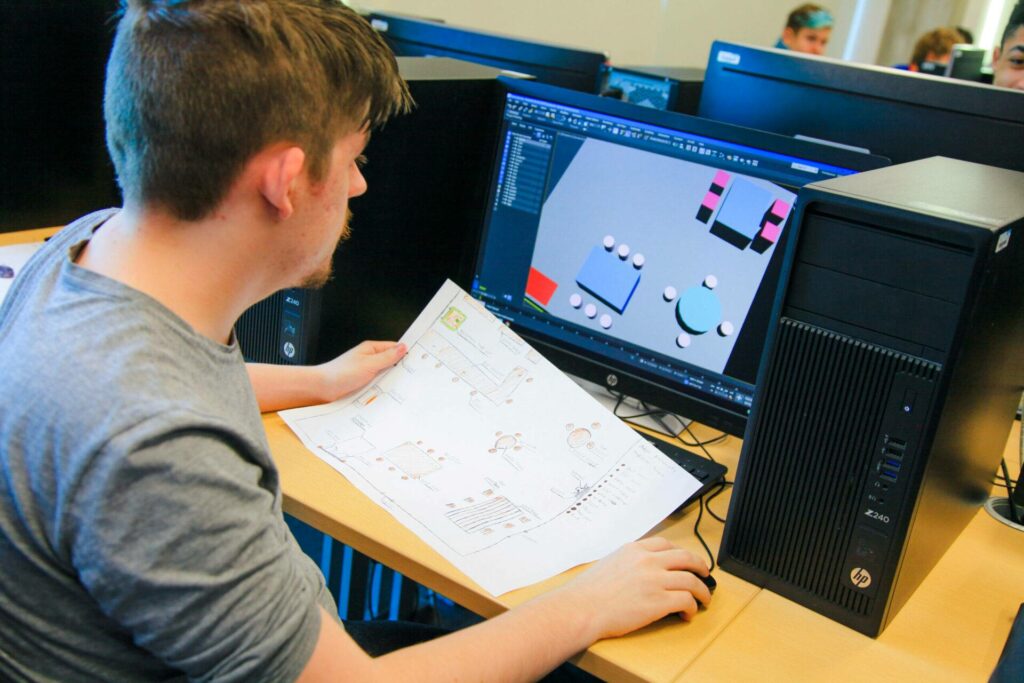What Our Students Say
Did you know!
- T levels are a two-year study programme, where 80% of study is based in a classroom environment and 20% is focused on an industry placement with an employer.
- The T Level qualification has been designed and developed with over 250 global and leading employers, allowing and ensuring that you will gain the right level of knowledge and skills required by employers for the jobs of the near future.
- The digital production, design and development T level is specifically designed to allow potential applicants to experience first-hand requirements of a challenging yet rewarding career in the digital and creative industries, whether that is within the web industry, games industry or a global business. The requirements for computer programmers and general computing enthusiasts is ever increasing with the emergence of newer technologies such as augmented reality, virtual reality, game engine programming and artificial intelligence.
Course Information
Introduction
T-Levels are a new, high-quality technical qualification in England, designed in collaboration with employers to give young people a head start in their chosen career. Equivalent to three A-Levels, a T-Level is a two-year course that combines classroom-based learning with a substantial industry placement. They were created to provide a skilled workforce for the economy, offering a direct pathway into skilled employment, higher apprenticeships or further study, including university. Unlike traditional academic routes, T-Levels focus on developing the practical skills, knowledge and behaviours needed for a specific industry, making students "work-ready" upon graduation.
For more information please contact arif.younus@leedscitycollege.ac.uk or adam.stringer@leedscitycollege.ac.uk
More about STEMOverview
The T Level in Digital: Software Development is a comprehensive technical programme designed to train the next generation of software professionals. This course is about mastering the entire process of creating digital solutions, from initial concept and design to coding, testing and deployment. It provides a versatile foundation for a wide array of careers in the digital sector.
You will learn to build secure, robust and user-focused software, with skills that are applicable across numerous fields. This includes developing business applications, creating dynamic websites and mobile apps, working with data systems, and even applying your skills to the domain of computer game development for those interested in that pathway. The course is built around a core understanding of the digital landscape, complemented by a specialist focus on software development principles and a mandatory industry placement, assuring you graduate with both the qualification and the real-world experience that employers value.
Who is this course for?
Ambitious 16-18 year olds or adults who want to pursue full-time education; as well as anyone who wants to develop key creative digital, computing and technical skills identified by many employers.
Course units/modules
The course is structured into core components and a specialist occupation, ensuring you gain both broad and deep knowledge.
Year 1: Core Knowledge & Skills
You will build a solid foundation in the principles that underpin all digital roles, including:
- The Digital Environment: Hardware, software, networking and virtualisation.
- Digital Analysis: Using data to solve business problems and inform development.
- Cybersecurity: Principles of protecting systems, data and user privacy.
- Legal & Ethical Aspects: Understanding intellectual property, data protection (GDPR) and ethical software design.
- Software Development Lifecycle: Planning with Agile methodologies, designing algorithms and using version control (Git).
- Emerging Trends: Exploring the impact of AI, Cloud Computing and the Internet of Things (IoT).
Year 2: Occupational Specialism (Software Developer)
You will specialise by applying your core knowledge to practical software development:
- Problem Analysis: Interpreting briefs to design software solutions.
- Software Design & Development: Writing clean, efficient code in languages like Python, PHP, HTML, CSS, JavaScript, MySQL and applying Object-Oriented Programming (OOP) principles, and developing user interfaces.
- Testing & Evaluation: Designing test strategies, identifying and fixing bugs and evaluating your final product against requirements.
- Practical Project: You will complete a significant project, such as building a web application, a mobile app, a data tool, or a game prototype, to demonstrate your end-to-end skills.
Industry Placement
You will complete a minimum of 45 days (315 hours) working with a real employer, applying your skills in a professional setting like a software company, a digital agency, or a computing department.
Benefits and skills
A respected, career-focused qualification valued by employers and equivalent to three A-Levels, it provides a direct route into a skilled profession without being a purely academic pursuit.
- "Learning by Doing" with an Industry Placement: The extensive 45-day placement gives you genuine workplace experience, a professional network and a significant advantage when applying for jobs.
- Versatile and Future-Proof Skills: The skills you learn are in high demand across every sector of the economy, from finance and healthcare to entertainment and game development, ensuring a wide range of career options.
- Multiple Progression Pathways: Upon completion, you can choose to step directly into a role as a Junior Developer, Web Developer, Game Programmer or Application Support Analyst, pursue a Higher or Degree Apprenticeship, or use the UCAS points to go to university.
- Build a Professional Portfolio: The practical projects and placement work provide you with a portfolio of evidence to show potential employers or universities, demonstrating your capability beyond exam results.
Entry requirements
Five GCSEs at grade 4 or above including English and Maths
Available apprenticeships and progression options
You can progress to a university of your choice and study various courses in the creative and digital industries including computer game programming, web development, software development and data analytics.
You also have the option to study a Higher Education course in computer game development and computer science at our University Centre Leeds institution.
Completing this T Level will also support progression to entry-level job opportunities in computer game programming, software design and development, web development, mobile app development, general programming.
Assessment types
Assessment is done via a range of assessment methods including assignments, employer and external-based assignments and exams.
Employment Statistics
-
Programmers and software development professionals
Average Salary£49,400
-
Graphic and multimedia designers
Average Salary£31,200
-
Aircraft maintenance and related trades
Average Salary£42,120








Follow us on Social Media